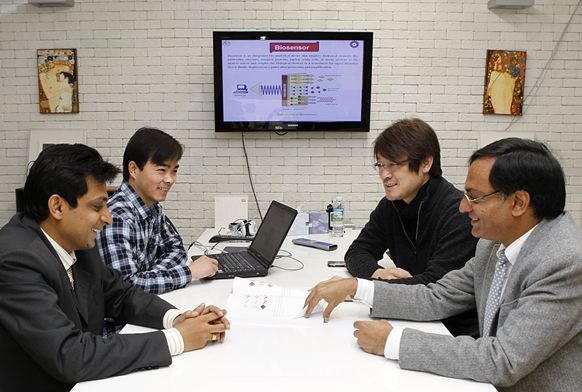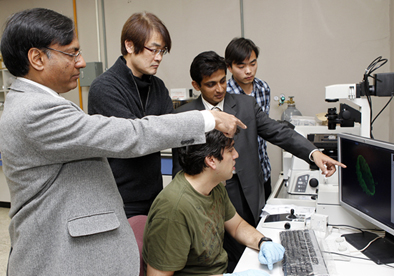“Indeed WCU!” Yeungnam Unviersity Nano Project Group N
No.88355- Writer YU
- Date : 2010.09.01 10:06
- Views : 14664
Nanotechnology (NT) research, which will bring about a \'revolution\' in human life, leading \'Nano Powerhouse Korea\'
Publishing a monthly average of 3.2 theses, and Publishing 1.4 theses a month per professor in SCI journals
[April 19, 2010]
Everything in the world is becoming smaller. A super computer that was as big as a house is now made in a chip that is the size of a human thumb. Items that are small, as well as have unique and unexpected features are being produced. \'Nano\', which means \'ultra small\' or \'extremely fine\', technologies are changing the world. The applications of nanotechnologies are limitless, and is currently used in solar cells, semiconductors, wall-mountable TVs, laundry machines, shampoo and cosmetics. Nanotechnologies (NT), which control the properties of a substance that is 1/100,000 the size of the human hair (1nm=1m/1 billion), is said to be the \'3 major science technologies\' together with information technologies (IT) and bioengineering technologies (BT) of the 21st century, and is leading technological revolutions.
The \'Yeungnam University Nano Project Group\' (director Joo, Sang-woo, School of Mechanical Engineering), which is conducting the \'WCU (World Class University) project\' of MEST, is revealing its world-class research performance, and brightening the future of Korean NT.

Professors of the Nano Project Group are having discussions on the development of bio-sensors that apply NT
(from left, clockwise, Professors Barnerjee, Xu, Joo, Sang-woo, Sharma)
Since its full-fledged research in September of last year, during the 7 months, the Yeungnam University Nano Project Group published a total of 24 SCI theses for a monthly average of 3.2. It has published theses in world prominent SCI journals such as ≪Physical Chemistry, A≫ and ≪Biomicrofluidics≫ under the name of the Yeungnam University Nano Project Group.
≪Physical Chemistry, A≫ is a specialized academic journal issued by the American Chemistry Society, and is in the top 3 of the 106 journals in the related sector. ≪Biomicrofluidics≫ of the American Institute of Physics is ranked in the top 10 for the liquid and plasma dynamics sector. Despite this, publishing 3.2 theses monthly in SCI journals was possible due to the excellence and efforts of the professors participating in the nano project group.
Professors currently participating in the Yeungnam University Nano Project Group area are Professor Joo, Sang-woo(director, 51, School of Mechanical Engineering), Professor Ashutosh Sharma (49), and Professor Shizi Qian (39), as well as Professor Arghya Narayan Banerjee (35), who joined in March and Professor Lin Xu (30), who joined in early April of this year.
Theses published by them in SCI journals can be averaged out to 1.4 per month by each professor. When including joint research theses, 16 theses were published by Joo, Sang-woo, 12 by Qian and 9 by Sharma in SCI journals. Professor Banerjee has applied 5 of his theses to SCI journals in his first month and is waiting for its publication. In addition, the Yeungnam University Nano Project Group published a total of 12 theses by participating in domestic and international academic conferences, and is accumulating quite noticeable research achievements such as providing nanotechnology consulting for the Korea Institute of Machinery & Materials (KIMM).
Normally, physical time required for applying, screening and publishing of SCI theses are approximately 6 months. Therefore, it is possible to say that the Yeungnam University Nano Project Group\'s SCI theses publication and research performance exceeds world-class and is at the world best level.
Professor Sharma, who is a chair-professor of the India Institute of Technology (IIT) that is called the \'MIT of India\', as well as one of the 5 major scholars of global nanotechnologies, and in particular nano-patterning, stated \"It is difficult for universities to publish more than 10 SCI theses in a year even in the US, China, Japan and Europe, which are advanced nations in the nanotechnology sector.\" He added, \"It is remarkable that we published 24 SCI theses in just 7 months of starting full-scaled research.\"

Research on \'Nano Bio Technologies\', Contributing to the success of the High-tech Medical Complex
Based on such research achievements, the project group is planning to focus on nano fusion technology applications and experimentations this year. In particular, by hosting the High-tech Medical Complex, they are planning to promote \'nano-bio\' technology research, which will be the future competitive edge of the region.
Director Joo, Sang-woo, explained, \"A nano-robot smaller than a white blood cell will go into the veins of humans to fight off germs, and treat injured areas using necessary medicines, and by attaching arms that can attach medicine to cancerous cells, it will be possible to select and kill cancer cells. All this is possible through NT.\" He also added, \"We will play a leading role in research and application of nanotechnologies, so that our nation will have competitiveness in the global nano market, which is expected to be worth 1 trillion dollars by 2015.\"
Meanwhile, the Yeungnam University Nano Project Group, which was selected for the WCU project by MEST in late April, will receive national funding amounting to 3.5 million dollars until August 2013 in order to conduct fundamental research on nanotechnologies, and development of fusion technology.